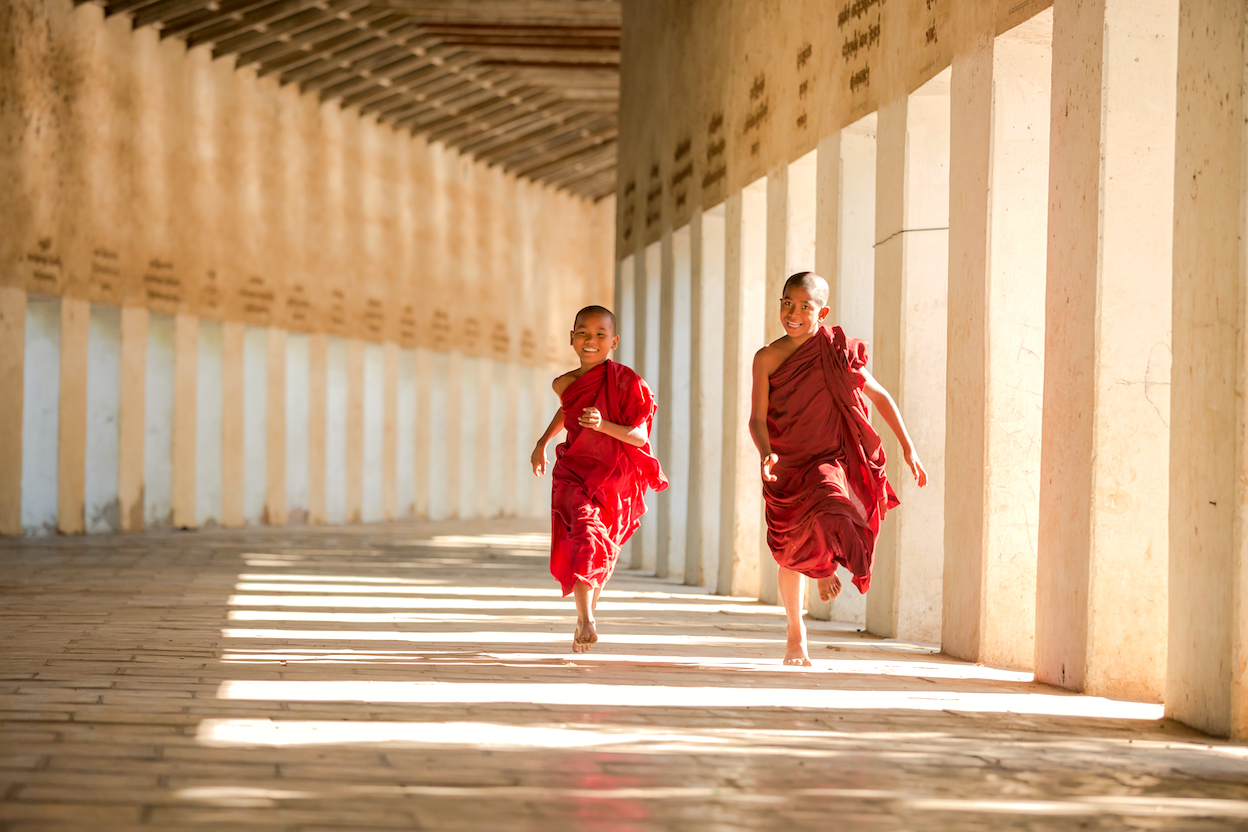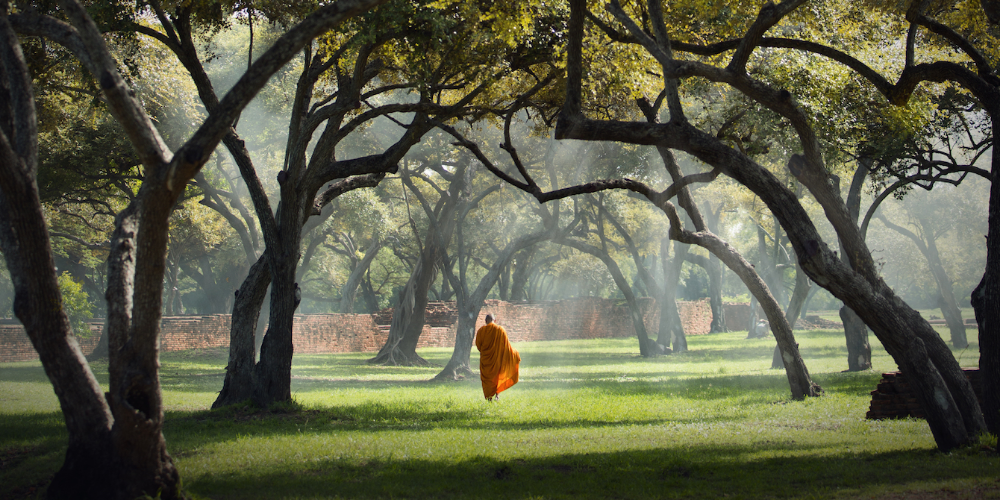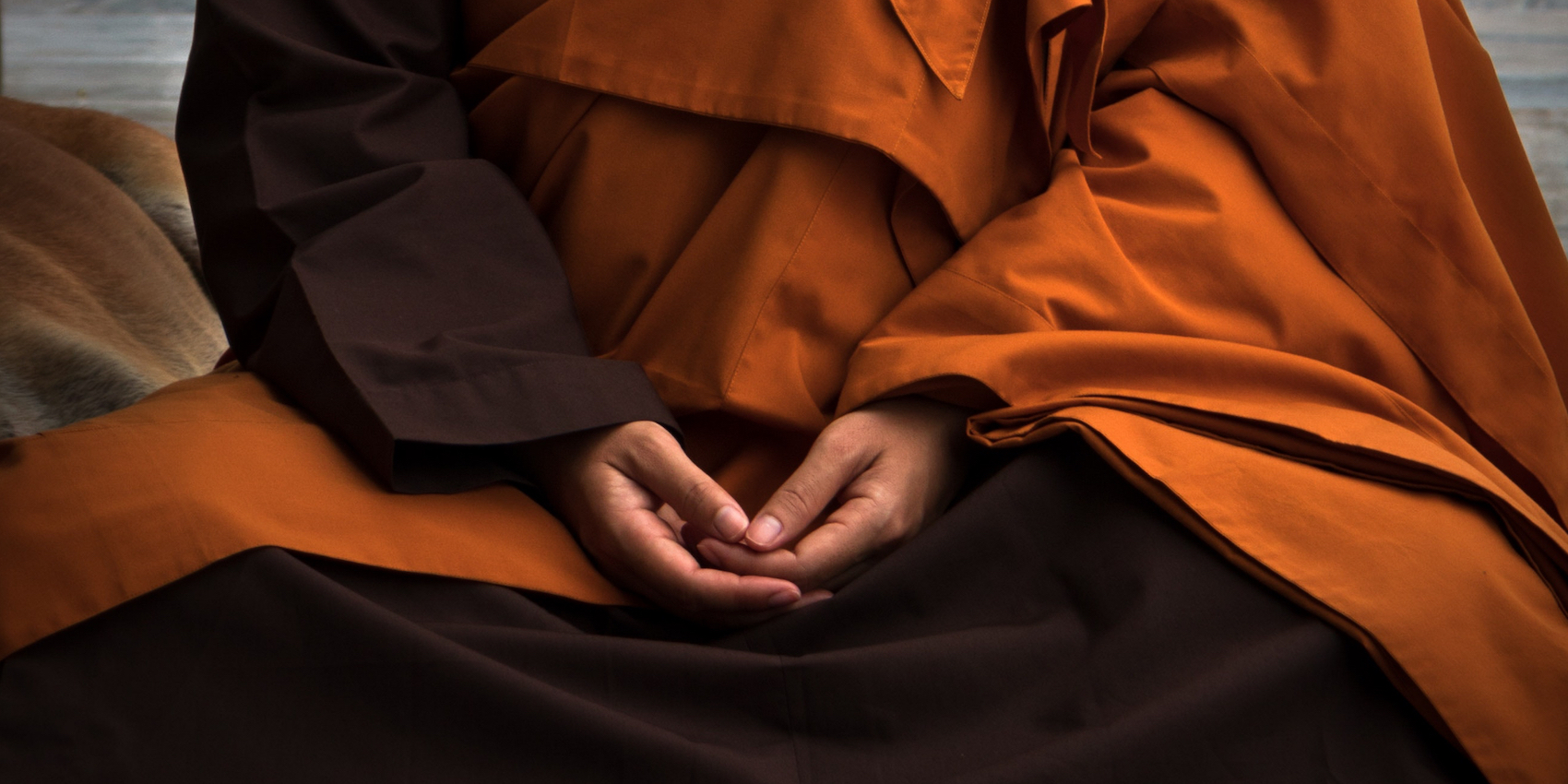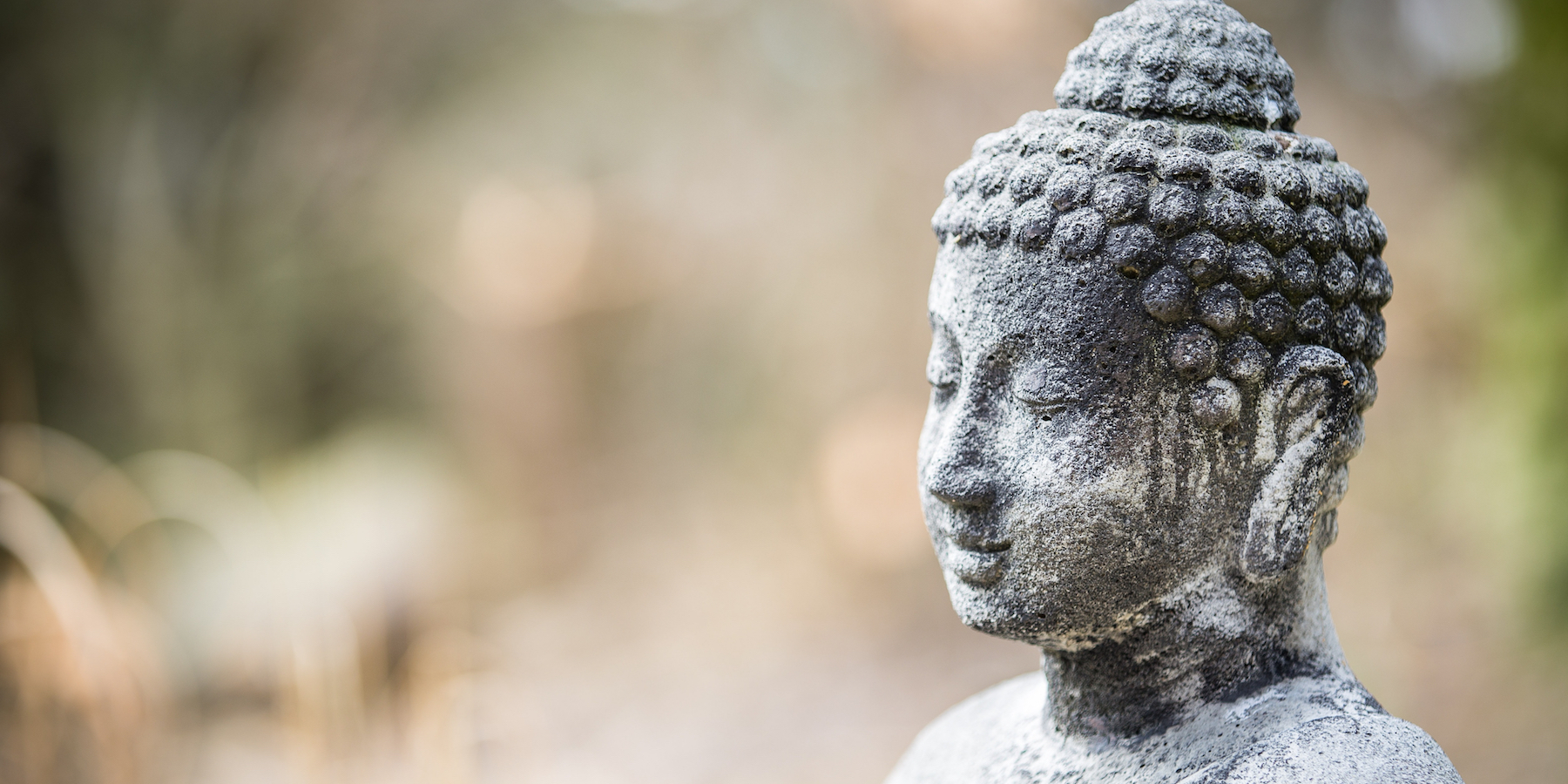When I was first asked if I wanted to run a trail relay race, I was hesitant on several counts: I wasn’t sure if I had enough time to train and avoid injury, I don’t run fast, there are so many other things to do etc. On the other hand, my 16 year old would be racing also, so there was the incentive of being involved in an adventure with him. What put me over the edge was knowing that, given the right circumstances, a little discomfort can go a long way to promote growth.
One of the first things I noticed once I committed to the race about a month later, is that my training and health habits seemed to kick into gear with more ease than I might have expected. Some semi-conscious preparation had been going on which made the transition feel almost graceful. Sometimes I get lucky like that, but I also consciously bring spiritual practices into my training. For instance, when I come to a part of the run that is difficult in some way, I sometimes recite the Metta Sutta (the Buddhist teaching on cultivating limitless good will) out loud.
I admit, one reason is that it’s the only sutta I have memorized; but also, to speak out loud requires an easy pace, and speaking teachings on good will, in my experience, can be uplifting and bring relief.
Reflection On The Metta Sutra When Facing Challenges
In the middle of a recent long run, I started to say the Metta Sutta, and was struck by how relevant many of the lines are to the training process for a race, or for any challenge. I started breaking it down as I ran.
The Cultivation Of Well-Being
The Sutta opens with a description of a being who might engage in this practice of Metta:
“One who is skillful in the cultivation of well-being, who wishes to break through to the state of peace…”
Does this describe us?
I find it interesting that it doesn’t say “master in the cultivation of well-being,” just “skillful”. I take it as an invitation to observe where we are making those little wise decisions that lead to our well-being.
To build upon even our smallest strengths is enormously important in cultivating any practice, whether it’s physical, mental or spiritual. And if we have been offered a challenge, we come to the first important threshold: will engaging in this race likely contributed to my long-term well-being?
The teaching on good will is closely related to ahimsa, or non-harming — it is the sincere wish for the opposite of harm. Cultivation of well-being requires us to assess this at each step. We don’t have to be correct every time we make this assessment, but we can be sincere. This is an important decision to make, but it’s also important to have the ability to gracefully withdraw if you decide that the activity isn’t for your long term well-being.
Read more: Learn how to bring ahimsa into your life and how to be kind in every aspect of life.
How To Comport Oneself
The metta sutta then goes on to describe how the practitioner should generally comport themselves:
“Should be capable, upright and straight-forward, open, gentle and without conceit, content and easily supported, living lightly, with few duties, wise, with faculties all at peace, modest, without greed for supporters, and should not do the least thing that the wise would criticise.”
“Should be capable, upright, and straight-forward…” This just sounds like good running form, and in meditation practice and spiritual practice in general, our physical form often represents the embodiment of our inner cultivation. I like to contemplate how I might successfully embody these qualities.
“Open, gentle and without conceit…” “Open” can point to both posture and state of mind. “Gentle” lends itself to the idea of making our footfalls light, to control impact on our joints. The idea of conceit usually evokes an image of a person who thinks they are better than others. I have come to appreciate the notion that conceit covers the whole range of self-centered comparative thinking, i.e., thinking we are better than, equal to, or worse than others. While having some competitive spirit can be fun and motivating, the understanding that we can’t adequately compare ourselves to others, due to a myriad of reasons, can be quite a relief; especially if you’re a runner like me — not so fast. But for anyone, letting go of “comparing mind” is a big step toward a mind that is open, gentle, and more free.
“Content and easily supported…” This speaks to the idea of being truly and wholly in the place we find ourselves in life, on the trail. We are content because we know that certain actions have lead to this moment, and certain actions will lead to the next; but this is the one we’re in now.
Truth is a cardinal virtue, and viewing our situation as it actually is is a kind of truth-telling to ourselves. Not that we stop there and accept a poor situation as our ongoing station in life — we don’t sit down during the toughest part of the trail — but we see it for what it is and use it as a basis for moving forward. In my case, as a runner in training, if I view myself as a faster runner than I actually am, I run the risk of injuring myself when I train, because the muscles, bones, tendons, etc., haven’t caught up to this new pace yet. They may eventually get there, but I must begin from here.
“Living lightly, with few duties…” We must have allowed ourselves to feel this just a little bit when we said “yes” to a challenge that was going to take some training. We had to mentally lighten our load to allow space for it. The spiritual notion of “living lightly with few duties” isn’t necessarily asking us to quit our jobs (though in some cases it probably is), but to gradually transform our relationships to the tasks of life so that they are in harmony with good will for ourselves and others. I admit, I still vacillate quite a bit when it comes to these kinds of challenges, as far as whether I think it was a good idea or not on any given day, so that becomes part of the practice — keeping that open, light mind. And again, the idea of being light on the ground is a hint at good, non-damaging, running form.
“Wise, with faculties all at peace…” This is both straight-forward and a tall order. But it is an important refrain — a steady question to ask our being. We know that the results of living with our faculties at peace are better than the alternative, and that it’s probably wise to cultivate that.
What comes to mind here is not necessarily race training, but exercise in general: having regular exercise as a steady part of my life has had huge implications for my general state of peace. As someone who is prone to defaulting to anger when there’s stress, I’ve noticed a direct correlation between exercise and my ability to cope skillfully with challenging situations.
“Modest, without greed for supporters…” This places us humbly on our own path. Ultimately, we have chosen our challenge and must support ourselves, and in doing so, not cast about for recognition of our sacrifice or prowess. If we are in it for our well-being, it’s a no-brainer.
“And should not do the least thing that the wise would criticize.” This always begs the question: who are the wise? I’m always asking myself this question. As it relates directly to running, my studies have been limited. I do love the book “Born to Run,” by Christopher McDougall. It really inspired me to go from a non-runner to someone who feels comfortable heading out for five or more (slow) miles, but I love it most of all for how it reveals that having a great heart is one of the secrets to great running. So, finding good teachers and teachings is vital — find the wise, and make a daily practice of seeing yourself in their eyes.
Pause here and practice metta and other meditations with Mark Zelinksy:
- 10 Minute Metta for Goodwill & Loving-Kindness Mark Zelinsky 10:52
- 20 Minute Metta Mark Zelinsky 20:48
- Body Sensations Meditation Mark Zelinsky 18:00
- Sympathetic Joy (Mudita) Mark Zelinsky 13:30
- A Beautiful Place Meditation Mark Zelinsky 15:00
The Wishes We Cultivate For The World
Now that we’ve covered the description of the person who should engage in this practice of good will (and/or a trail race), we move on to the next section, which is about our intentions, the wishes we cultivate for the world:
“One should reflect, happy and secure, may all beings be happy at heart, whatever beings there may be, weak or strong, without exception, long, large, middling, short, subtle, blatant, near, far, seen, unseen, born or seeking birth. May all beings be happy at heart.”
When Metta is taught, it is sometimes taught with repetitive phrases like, “may I (you, they, all) be happy,” which are intended to invoke the feelings of good will, which will hopefully then develop into the state called Metta or unlimited good will.
It can be very fortifying, as fear, weariness, anxiety, pain, etc., take hold while training for a race, or just doing life (which, after all, may be seen as a kind of training), to bring our intentions of good will to the fore and let our mind reside there.
This is a very short section, an admonition against deceit and ill will.
“One should not deceive another,”
Again, pointing to the cardinal virtue of truth. Ultimately, deception of one’s self turns out to be the biggest issue; deception is a poor foundation for anything of value, and so there is no place for it in our well-being.
“nor despise anyone, anywhere, nor through anger or aversion wish for another to suffer.”
This is kind of a reminder of the opposite of good will. We can’t get the metta juices flowing if we are wishing for someone to suffer. There’s a bit of a fine line here when it comes to these types of challenge. There’s a bit of “no pain, no gain” and the idea that pure coziness isn’t really great for our spiritual development — otherwise why the hell would I be doing this to myself? But if we return to the idea of long term well-being it’s a simple enough equation, if not that simple to accomplish.
Read more: Explore how discomfort in yoga, meditation and life in general plays an important role in personal and spiritual growth.
Committing To The Good Will
We’ve already seen that all beings without exception shall be included in our good will, but this next passage really drives home the extent of our good will and the level of commitment we should maintain toward the great scope of the practice:
“Just as a mother would risk her own life to protect her child, her only child, so one should cultivate a limitless heart in regard to all beings. With good will for the entire cosmos, one should cultivate a boundless heart, above, below, and all around, whether walking, standing, sitting or lying down [or running!], without obstruction, ill will, or hate. Whenever one is alert, one should be resolved in this mindfulness.”
Pretty serious business. It’s easy to get lost in the imagery. Especially if you have kids, it’s hard to get past the idea of how much effort you would expend in giving up your own life to save your child — a poignant metaphor indeed; but then to apply that same effort to boundless good will… well, it’s an impressive invitation.
And so again, as seems wise to me, we begin with ourselves — the one we are most responsible for — and say: I am not going to do you harm if it is in my power to prevent it; furthermore, I am going to ask of you some things that might feel like harm (like running this crazy-ass race), because it is my duty to foster well-being. How far does this intention extend? It is without bounds.
Discover hundreds of free guided meditations for loving-kindness (metta) to develop impartial and unconditional love.
The Greater Buddhist Path
My take on this final passage of the metta sutta is that it presumes you’ve taken up the script of the rest of the sutta and gives some insight into the final step. Because, in a way, this points to the greater Buddhist path.
“One who is virtuous, consummate in vision, not taken by views, and having overcome clinging to sensual pleasure, shall never again lie in the womb.”
“One who is virtuous…” Again, we are pointed to the truth. I could go on about how there’s no spiritual path without virtue, but let’s just return to the idea that a commitment to truth is the best foundation for anything that we want to turn out well. Or one might simply say: doing what isn’t good and true is counter-productive. It’s a path of discovery, but one that I’ve found worthy of investigation.
“Consummate in vision…” The idea of the seer is well-known in spiritual study, but what does it mean for the wannabe athlete? I’m going to take a page out of my limited cross country and spiritual diary and speak from that. I remember a couple times when I felt most at ease, even joyful, as I ran. I relaxed my focus, so that I was no longer focusing on my breath, or my pace, or pain, and it felt as though I merged into the landscape. It was the opposite of the slog that running can sometimes be — there was no more natural way for me to move at that moment. I think I was somewhat prepped for this from doing some concentration meditation, because it felt a little like that— a profound interpenetration of the environment and whatever I was carrying through it. This is probably, again, not exactly what the sutta has in mind, but I’ve come this far, and the end is near!
Read more: We asked Buddhist monk Ajahn Achalo and Buddhist teacher Dr. Miles Neale what being a Buddhist means to them. Read their inspiring and personal answers.
“And having overcome clinging to sensual pleasure…” Not too much of a reach to apply this line to hard physical training. I’m not suggesting that the Metta Sutta is prescribing hill repeats in order to break on through to the other side, but there is a quality of mind that is helpful in the person who will give up comfort for the right reasons. If you’ve looked into Buddhism, you may know that avoiding clinging is a pretty important idea. (Perhaps a disclaimer is appropriate here if you happen to be a climber, in which case, by all means, cling.)
Being “not taken by views” is a wonderful way to free yourself from other people’s opinions, and to free people from yours. While we must bear in mind what the wise would do, we can’t get caught up in every view we come across — it’s a riptide, and soon we shall be lost at sea. In training, while everyone has an opinion on the best way to do it, I try to take small, testable measures like playing with my foot strike or my breathing, or reciting suttas. I don’t have to become a convert and start preaching it because it works, but I am very happy to share what works for me, for now.
And so what’s the final payoff? “…shall never again lie in the womb.” Hm, not sure I’m going to tackle that one in this context. I sometimes prefer the translation: “Shall not be born again into this world.” But then, perhaps for now I’ll live a little more lightly for the sake of training for this race and say: if you apply yourself, muster your strength and wisdom to run the best race you can, you “shall never have to run this race again.”
May you all, and all beings, be happy at heart.
Read more: Scott Tusa reflects on the Four Seals of Buddhism and what it means to be a Buddhist.







